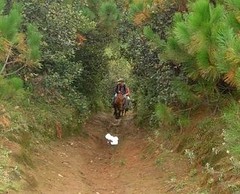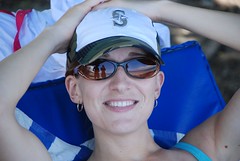 The concept of privacy is something that I have found myself thinking about quite a bit lately. Interestingly, Jeff and I were having a discussion about this idea more than a month ago (long before it became an essential question in our course!). I had just finished reading the book Pillars of the Earth by Ken Follet. Initially, I found the book very disturbing…it was pretty graphic with the violence and raw human aggression. However, it did make me think long after I had finished reading it. That’s when I classify it as a ‘good book’. Though I would clarify the recommendation with a caveat about the content of the book!
The concept of privacy is something that I have found myself thinking about quite a bit lately. Interestingly, Jeff and I were having a discussion about this idea more than a month ago (long before it became an essential question in our course!). I had just finished reading the book Pillars of the Earth by Ken Follet. Initially, I found the book very disturbing…it was pretty graphic with the violence and raw human aggression. However, it did make me think long after I had finished reading it. That’s when I classify it as a ‘good book’. Though I would clarify the recommendation with a caveat about the content of the book!
One part of the book that struck me was how during the middle ages, people lived in one room homes. Often in the book, the family sleeps in the great halls of the manors and castles. Many people and couples and children slept all together in one great room. Acts of lovemaking were done under the cover of a cloak…which afforded very little privacy for sure! This started me thinking about our current idea of privacy. Where did we develop this concept of what privacy means? In other cultures, how is privacy viewed?
 Living in China, we were witnesses firsthand to the arguments between couples on the streets and in the parks. At first we found this confusing, then we realized that being out in public probably afforded them more privacy than in their tiny, crowded homes! It also made me realize that not so long ago in America, people probably also went outside their homes to have a ‘private’ conversation. So when did we start making that switch, and why? When did we start moving towards this idea of privacy and a right to have our information and business kept to ourselves when historically, it would seem, it was anything but like this?
Living in China, we were witnesses firsthand to the arguments between couples on the streets and in the parks. At first we found this confusing, then we realized that being out in public probably afforded them more privacy than in their tiny, crowded homes! It also made me realize that not so long ago in America, people probably also went outside their homes to have a ‘private’ conversation. So when did we start making that switch, and why? When did we start moving towards this idea of privacy and a right to have our information and business kept to ourselves when historically, it would seem, it was anything but like this?
I find myself wondering if we are entering a new age of privacy and how we will need to define it. Case in point: I am a reluctant (putting it mildly) user of Facebook. Just recently, I visited my homepage and found a picture attached to someone else’s ‘newsfeed’ that was showing up on MY homepage. Now, I’m friends with the user who first started the feed, but am not friends with the people who commented on her note. Yet, their words and pictures were coming up on my page. Some of this content was disturbing and I was uncomfortable with it on my page. I ended up ‘unfriending’ the friend, just to be safe, but still found myself thinking about the incident long after it was over.
I guess this was one of the lessons that drove home this idea of controlling your online profile and protecting your own privacy. This week we read some articles that talked a bit about what online privacy means. The author of Don’t overestimate privacy of online information warns us to:
Knowing what a site’s terms of use are is critical before signing your name to anything, just as posting information about yourself. Before you join the popular world of social networking and post anything, know that someone out there may see it.
I think this is very good advice! The article talks quite a bit about recent developments in Facebook’s user policies and how they can change in a way that could remove any vestiges of privacy we may have thought we had.
Another article we read, Beware: the Internet could own your future, starts off with:
A friend sent me a bumper sticker on Facebook that read, “Do you ever look at a picture of yourself and see a stranger in the background? It makes you wonder how many people have pictures of you.” While I laughed upon reading the silly message, I also found myself a little disturbed.
I too find this idea somewhat disturbing…suddenly our idea of privacy is completely turned on its head! Where before, these pictures could end up in a stranger’s album, or at worst maybe posted on bulletin board, now these pictures are posted online to be seen by potentially millions of people. Add to this the prevalence of digital cameras (do they even make cell phones without one anymore?) and you have yourself a recipe for complete obliteration of our privacy.
So, this brings back my question…do we need to rethink what privacy means? How will we define what privacy means in this new, digital world that we are all (some of us reluctantly) existing in today?
 In my head I’m singing “back in the saddle again!” Here I go again…I can’t say that I missed writing on my blog during my few weeks of respite between
In my head I’m singing “back in the saddle again!” Here I go again…I can’t say that I missed writing on my blog during my few weeks of respite between 